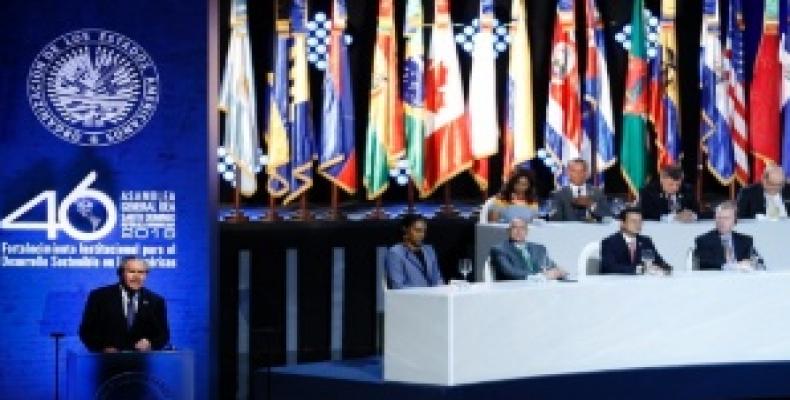Santo Domingo, June 14 (RHC)-- The Organization of American States, the OAS, has begun its 46th General Assembly in the Dominican Republic, where member states are debating the rights of Indigenous peoples and the political situation in Venezuela, where the government has been the target of the secretary general of the U.S.-based organization.
The OAS agenda for the meeting is focused on "Institutional Strengthening for Sustainable Development in the Americas."
Secretary General Luis Almagro invoked the OAS Democratic Charter against Venezuela, which could potentially lead to the suspension of the South American country from the inter-American organization. Almagro is the first head of the OAS to activate the charter against a member state in defiance of the will of its government.
Venezuela is currently suffering from one of its worst political and economic crises, fueled by a steep decline in oil prices coupled with speculation, hoarding and other actions that Venezuelan leaders consider an "economic war" by their opponents.
The OAS has long been accused by several regional governments of being overly influenced by U.S. foreign policy. The organization's headquarters is in Washington, DC.
Cuba was expelled from the OAS in 1962 for “adopting a Marxist government,” according to the organization. President Raul Castro has called it “an imperialist instrument." At a recent meeting of the Association of Caribbean States in Havana, Raul said: “Cuba will never go back to the Organization of American States.”
Also, as it does every year, the organization will analyze the sovereignty claims of Argentina over the Malvinas islands. It is expected that member states will approve a resolution that calls for the dispute between Argentina and the United Kingdom to be resolved through dialogue and negotiations.
The organization will also analyze the financial crisis of the Inter-American Commission on Human Rights (IACHR). James Cavallaro, president of the IACHR, is expected to urge member states to redouble their efforts to overcome an economic situation that could reduce the activities of the entity, which is responsible of ensuring human rights are respected on the continent.
The proposed agenda also includes the approval, after 17 years of negotiation, of the "American Declaration on the Rights of Indigenous People." This declaration acknowledges the rise in regional conflict that affects Indigenous people, including in the loss of land and natural resources, and gives those communities special rights and protections. The delegations from Bolivia and Mexico have been the main promoters of the declaration.


